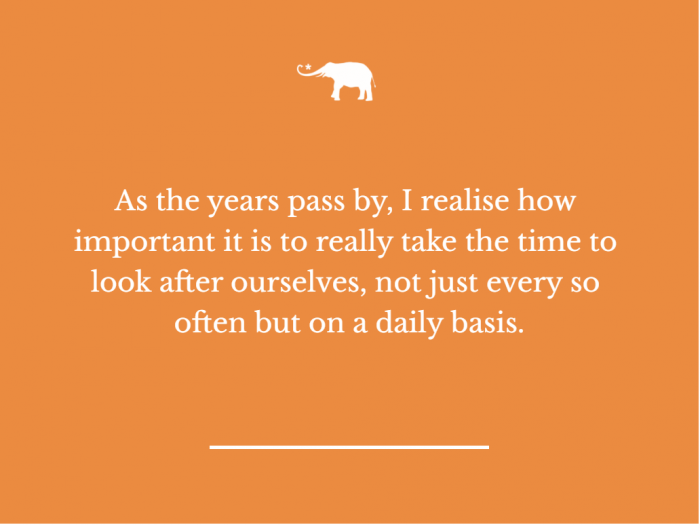I first learnt about self-care a long time ago when I read The Art of Extreme Self-Care by Cheryl Richardson.
It was a great introduction to a subject that I knew little about at the time. As the years pass by, I realise how important it is to really take the time to look after ourselves—not just every so often but on a daily basis.
Self-care is essentially about caring for oneself. Simple as it may sound, it’s a big topic as there are many ways to do this—especially as everyone is different. For one person, self-care might be going out and exercising every day because they know that it really helps them to centre and be ready for the day ahead. Whereas for another person, self-care might be having a lie-in and just taking their time getting ready for the day. It’s really about tuning into yourself and asking what you need on a daily basis or an even more regular basis (for example, hour by hour, moment to moment) if that resonates.
For some, self-care may seem a luxury or even a non-essential activity. There are so many other things to do in life, why focus on oneself?
I’ve discovered that self-care is a necessity if we want to be able to really feel good in ourselves and if we want to be there for others. Self-care is a way of being loving and kind to one of the most important people in this world; that is, ourselves.
If we can’t be kind and loving to the one person who we’re with all the time, then how can we possibly be loving and kind to others on a truly genuine basis?
Part of self-care is being able to set boundaries and saying yes to what we feel good doing and no to what does not. For example, I learnt at a young age through watching my parents and other extended family members that giving everything of oneself was noble and a good quality to have. If someone was in need, then it was important to step in and help them in some way. However, what wasn’t shown was that when this was done from an unconscious level, then resentment built up and these acts of kindness were actually acts of guilt, often done out of obligation.
The intention that we have when doing something is hugely important. If we have a strong desire to, it feels loving and kind to all parties involved, and it feels good in your body (that is, you don’t feel uncomfortable emotionally or physically), then that would seem like a good step to take. However, if you do things that come from a basis of fear (for example, from anxiety, guilt, or pressure) then this is generally a sign that you need to do some inner reflection before taking this path.
Self-care gives others permission to look after themselves as well and to put their needs first. When we all start to take responsibility for ourselves and looking after our own needs, then we act from an empowered place. We are no longer victims reacting from a place of fear but rather powerful beings acting with love. We take action because it’s the right course of action for everyone involved rather than fearing rejection or abandonment.
Ready to practice self-care?
Set aside some time to reflect on the steps and questions below. If you want to start to really care for yourself and to see the benefits that this process brings, then invest in yourself by taking time out for this activity.
Here are three steps:
1. Reflect on what self-care is to you.
What would it look like to really care for yourself on a daily basis? What would you be doing? How would you be feeling?
Remember that self-care is personal to you and it doesn’t have to be a major activity. It might be something as simple as taking 10 minutes to drink a cup of tea or meditate before everyone else in the household wakes up. Or, it could be setting aside 30 minutes to just do nothing and simply watch the sky or the sea—if you’re lucky enough to live near one!
2. Did you notice any resistance come up for you when you looked at the first step above?
Did a part of you feel silly or indulgent for example? Or guilty perhaps?
Really pay attention to this aspect of yourself that feels resistant to looking after yourself and see if you can identify where it comes from. If like me, you’re didn’t grow up in an environment where self-care was prominent, it could feel uncomfortable to even think about looking after yourself or making yourself a priority. Just notice and observe these thoughts and feelings without having to necessarily dive into the stories behind them.
3. What is one act of self-care that you’re willing to include in your day?
Schedule it into your day in a way that feels right for you. If you feel resistance within you, allow it to be there but commit to your self-care nonetheless. If you don’t take the time to prioritise and look after yourself, who will?
I hope this exercise really helps you to begin this journey of self-care and see how this benefits not only yourself but also others by doing so. It’s not a luxury to look after ourselves, it’s truly a necessity. I hope that self-care becomes a part of your everyday life, something as natural to you as breathing.
~











Read 0 comments and reply